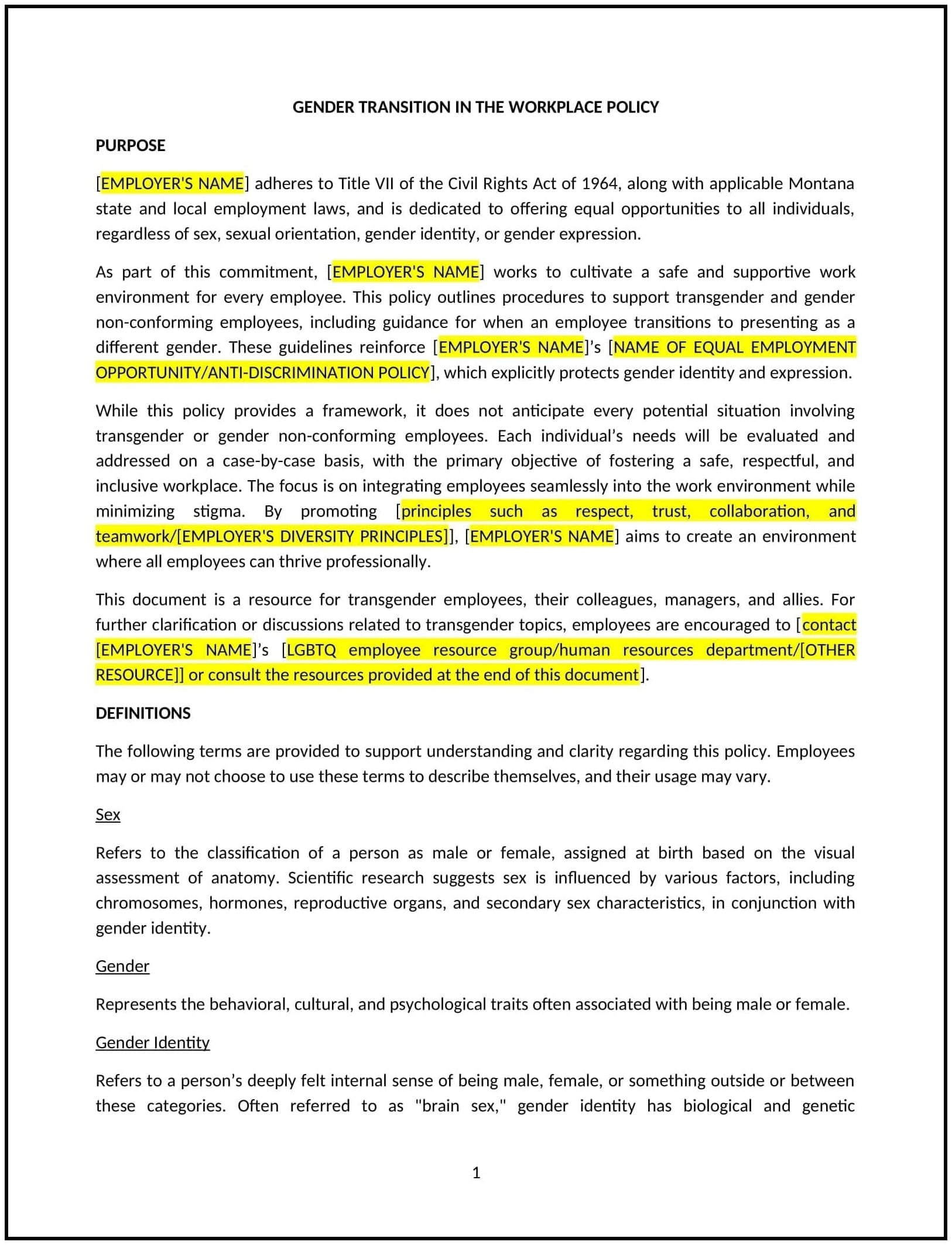Gender transition in the workplace policy (Montana): Free template
Got contracts to review? While you're here for policies, let Cobrief make contract review effortless—start your free review now.

Customize this template for free
Gender transition in the workplace policy (Montana)
A gender transition in the workplace policy helps Montana businesses support employees through their gender transition process, creating an inclusive and respectful environment. This policy outlines the process for employees undergoing a gender transition, including steps for maintaining dignity, ensuring confidentiality, and providing support to employees and colleagues during this time.
By implementing this policy, businesses can promote diversity, inclusivity, and a supportive work environment, enhancing employee well-being, reducing discrimination, and fostering respect and understanding among all employees.
How to use this gender transition in the workplace policy (Montana)
- Define the scope of the policy: The policy should specify what constitutes gender transition and include support for employees in various stages of their transition. This includes changes in name, pronouns, appearance, and any medical treatments or surgeries employees may undergo.
- Set expectations for respect and inclusivity: Businesses should emphasize the importance of treating all employees with respect, using correct names and pronouns, and creating a safe and welcoming environment for employees during their gender transition.
- Address confidentiality and privacy: The policy should ensure that employees’ privacy is respected during the transition process. Information about an employee’s gender transition should only be shared with others with the employee’s consent.
- Offer support and accommodations: The policy should outline the support and accommodations available to employees undergoing a gender transition, such as flexible scheduling, access to healthcare resources, and counseling services.
- Establish a process for name and pronoun changes: Businesses should provide clear guidelines for updating employee records, email addresses, business cards, and other documentation when an employee requests a change in their name or pronouns.
- Promote training and education: The policy should encourage ongoing training for employees and managers on gender identity, inclusivity, and the needs of employees undergoing gender transition, helping to prevent misunderstandings or discriminatory behavior.
- Review and update regularly: Businesses should regularly review and update the policy to ensure it remains aligned with best practices, legal developments, and employee feedback.
Benefits of using this gender transition in the workplace policy (Montana)
This policy provides several key benefits for Montana businesses:
- Fosters an inclusive workplace: A gender transition policy creates a welcoming and supportive environment for all employees, demonstrating the business’s commitment to diversity and inclusion.
- Reduces discrimination and bias: A clear and structured policy helps prevent discrimination or misunderstandings by providing guidance on how to support employees during their gender transition.
- Enhances employee engagement and loyalty: Employees who feel supported by their employer are more likely to remain with the company and contribute positively to the workplace culture.
- Improves the company’s reputation: A business that supports gender transition and inclusivity demonstrates social responsibility and gains respect from customers, employees, and other stakeholders.
- Promotes legal compliance: The policy helps businesses comply with laws regarding discrimination and harassment, reducing the risk of legal action related to gender identity or transition-related issues.
- Strengthens employee morale: Employees who are treated with dignity and respect, especially during a significant personal transition, are more likely to feel valued and motivated to perform their best.
Tips for using this gender transition in the workplace policy (Montana)
- Communicate the policy clearly: Ensure that all employees are aware of the policy and understand their rights and responsibilities, as well as the company’s commitment to supporting employees undergoing a gender transition.
- Train managers and HR staff: Provide training for managers and HR personnel on handling gender transition requests, offering support, and maintaining a respectful and confidential environment for all employees.
- Be proactive in offering support: Regularly check in with employees undergoing a gender transition to offer support and ensure they have access to any accommodations or resources they may need.
- Maintain confidentiality: Respect the privacy of employees undergoing a gender transition by not disclosing sensitive information without the employee’s consent, unless required for legal or operational reasons.
- Offer resources and support: Provide access to counseling, healthcare, and other resources that may assist employees during their gender transition, helping them feel supported throughout the process.
- Review the policy regularly: Periodically review and update the policy to reflect changes in laws, industry practices, and employee needs, ensuring it remains relevant and effective.